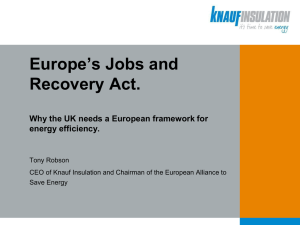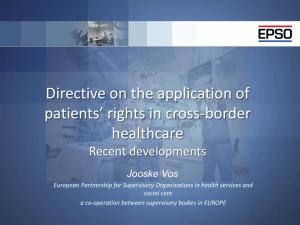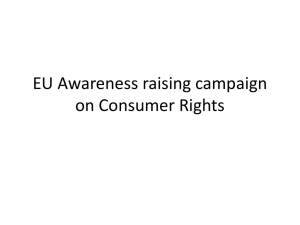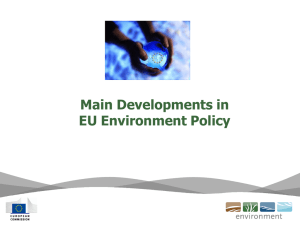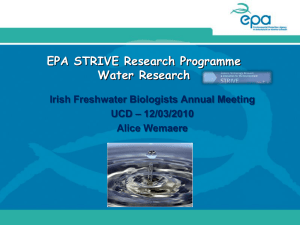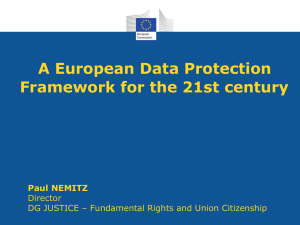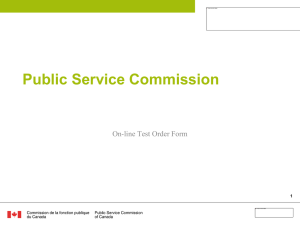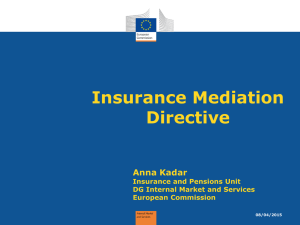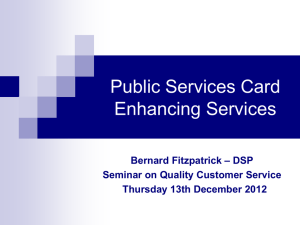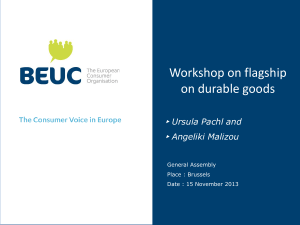Commission presentation - Irish Point of Single Contact
advertisement
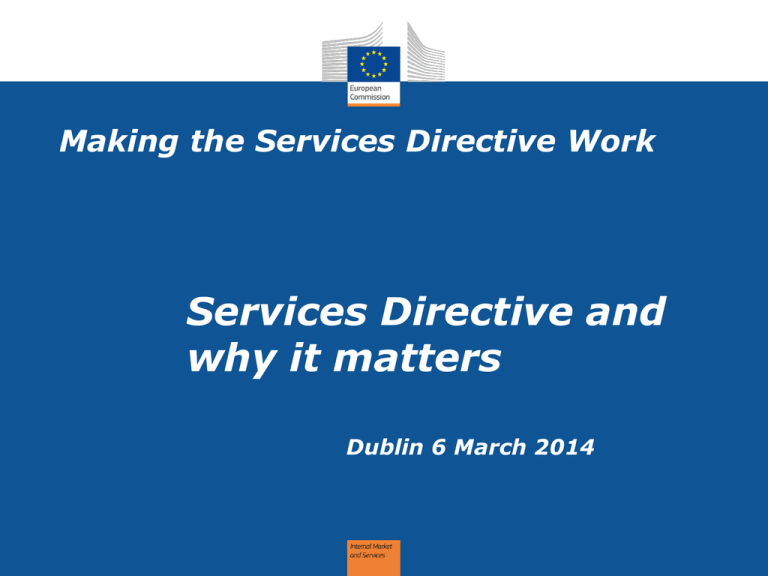
Making the Services Directive Work Services Directive and why it matters Dublin 6 March 2014 Outline of the presentation I. • - General introduction to the Services Directive - A framework Directive with exclusions - Economic importance - Contents of the Services Directive - Implementation and future notifications. II. Points of Single Contact 6/04/2014 2 Services Directive Horizontal “framework” Directive: covers all service activities unless they are explicitly excluded: e.g. 1. - commerce and retailing, 2. 3. 4. 5. - construction and crafts, business- related services (consultancy, advertising etc.), most regulated professions, tourism, etc. Complements the existing EU “acquis”: specific provisions of EU law prevail in case of conflict 6/04/2014 3 Exclusions • financial services, telecommunications, transport services • healthcare services • certain social services • audiovisual services • temporary work agencies • private security services • gambling services • services provided by notaries and bailiffs 6/04/2014 4 Economic importance of services in general • Services represent around 70% of EU GDP and total employment • Over the last decade, rapid and sustained shift from industrial production to knowledge-based services • Services have been the source of all net job creation in recent years / 9 out of 10 new jobs • About 75% of services trade concerns the supply of services to other business, in particular industry 6/04/2014 5 Economic importance of the sectors Services covered under the Services Directive: 45% of EU GDP 6/04/2014 Economic importance of the implementation of the Directive • + 0,8% of EU GDP within 5 to 10 years as implemented. • + 2,6% of EU GDP within 5 to 10 years if Member States eliminated almost all remaining barriers • Impact differs between Member States depending on: – Extent of barrier reduction – Barrier reduction by trading partners – Economic importance of the services sector 6/04/2014 4.5 4 Impact GDP 2011 Minimum implementation 3.5 Impact GDP 2011Full implementation 3 2.5 2 1.5 1 0.5 0 CY 4/13/2015 ES UK LU NL DK AT SE FR EU27 EE MT EA BE DE IE EL PT IT LV FI CZ SI HU PL LT BG SK RO 8 Contents of the Services Directive • Administrative simplification and Points of Single Contact • Freedom of establishment (internal and crossborder cases) – remove unnecessary barriers • Freedom to provide/receive cross-border services – remove • Quality of services (insurance) • Administrative cooperation (Internal Market information System (IMI) 6/04/2014 9 Implementation until 2009 and in the future To implement the Services Directive correctly: need to know what is existing and what needs to be done/amended, i.e. need to SCREEN the existing legislation, covered by the Services Directive - Initially linked also to the obligation to report to COM (art 39) for specific requirements. - May need several iterations. 6/04/2014 10 Notifications via Internal Marekt Information System (IMI) For any new legislation: obligation to notify the COM and other MS requirements falling under: • Art 15 (establishement requirements to be assessed) • Art 16 (requirements imposed on cross-border service provision) • Disproportionnate barriers to business and to trade? Recommended to notify draft regulations to ease changes if needed. 6/04/2014 11 Point of Single Contact (PSC) Administrative simplification (Art. 5): MS need to examine and simplify their existing procedures and formalities In principle, authorities should not ask for: • Original documents • Certified copies of documents • Certified translations 6/04/2014 12 Points of Single Contact (PSC) A most tangible benefit for businesses: one interlocutor to get information and complete procedures Linked to the general obligation to simplify procedures First “horizontal” legal obligation for Member States to provide for e-government services for businesses Accessible for national & foreign users 6/04/2014 PSC: information provision Obligation to provide information on all procedures and formalities necessary for given activities. No need to contact different authorities/bodies anymore company registration, professional qualifications Information to be covered: requirements for procedures and documents to be submitted, contact details of the authorities, means of redress etc. Use of plain and intelligible language Assistance to questions from business 6/04/2014 PSC: completion of procedures online Businesses should be able to complete the necessary procedures and formalities to start or exercise an activity by electronic means and at a distance Both for national users but also for users from other MS (using their own means). • Cross-border access is a MAJOR CHALLENGE 6/04/2014 PSC: what is not mandatory but would be best practice for business? PSC to become a comprehensive e-government for business Cover procedures and sectors outside the SD Income tax, VAT, social security registrations etc. Take business user's perspective Provide also information & assistance on other issues relevant for the business users (e.g. access to finance) Foreign language availability 6/04/2014 Support tools available EUGO Network– cooperation with other MS and sharing of best practices E-Procedures Legal framework Practical tools to support creation and validation of esignatures (open source software) 6/04/2014 13/04/2015 13/04/2015 13/04/2015 13/04/2015 13/04/2015 PSCs in the MS – results so far (June 2012) 6/04/2014 PSC Charter: towards more ambitious PSCs Agreement at political level to go beyond the SD for business purposes; Regular benchmarking against common criteria, covering: Quality and availability of information E-procedures Accessibility for foreign users Usability 6/04/2014 Thank you for your attention!

